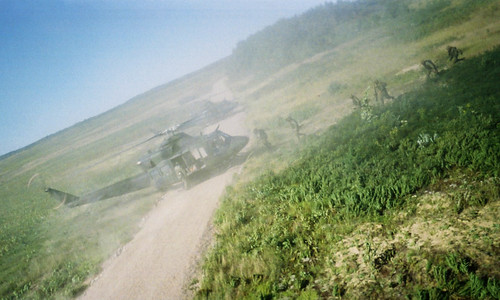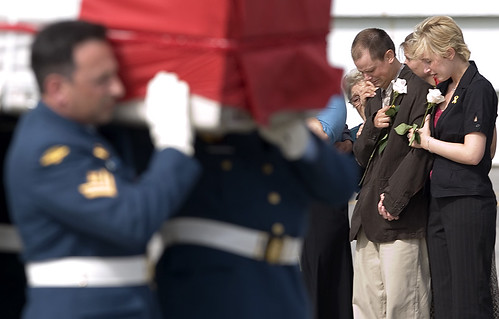Trending
Opinion: How will Project 2025 impact game developers?
The Heritage Foundation's manifesto for the possible next administration could do great harm to many, including large portions of the game development community.

Featured Blog | This community-written post highlights the best of what the game industry has to offer. Read more like it on the Game Developer Blogs or learn how to Submit Your Own Blog Post
In 'The Auteur Forum: Mechner and Chahi on Inspiration,' I recognize a provocative perspective to accept outside experience as more beneficial when it comes to designing games than experience gathered on the inside. I decided to share my personal example.

Gamasutra has no shortage of thought-provoking articles. Yesterday saw the addition of yet another stimulating feature: 'The Auteur Forum: Mechner and Chahi on Inspiration' by Eric Viennot. It is an English translation from the original French interview with Jordan Mechner, creator of Prince of Persia, and Eric Chahi, creator of Another World. Both men created what now could be considered classic games of the 1990's.
The comments about the interview praise the inspiring outlook of the auteurs - especially from the idealist aspiring designers, myself included. We have yet to create a 'classic' game of our own (which I'm sure there is at least one in each of our minds), yet we share with these masters the same sentiments about creating games.
Other comments raise the issue of how to teach, or where to find, the outside inspiration and experience that will feed the approach to game design.
The following thoughts from the interview are what I particularly found most inspiring, and in line with my own philosophy. I post them here as reference and because it's so damn good to read. My thoughts on their remarks, citing personal experience, follows...
Many people still picture developers as geeks stuck in front of their screen, but both of you are passionate about things that don't have anything to do with video games: Eric is into painting and volcanoes while Jordan is interested in the Templars, comics, and cinema. Do you use these as a source of inspiration or are video games simply one of your many areas of interest?
Jordan Mechner: In all creative fields, innovation comes from combining things that haven't been put together before. If you immerse yourself too single-mindedly in your chosen art form, whether it's video games, movies, comics or whatever, your work can easily become just a reflection of what others are doing in that field, rather than breaking new ground. A game should be about something, not just about other games.
Eric Chahi: Video games have to find their inspiration somewhere. Unless you are aiming for a completely abstract game, the interactive material from which video games are formed relies on symbols, codes, behaviors, rules, perspectives, points of view and emotions, all of which stem from our experiences outside video games.
Video games, like other expressive forms, cannot exist in a vacuum, they cannot feed on themselves. Video game creators draw from the real world, from their passions. All these inspirations brew in their subconscious until they find their definitive form, whether it ends up as something new or not.
What do you think should be the primary motivation for a game designer?
JM: For me the driving force in making a game, movie or graphic novel is to tell a story -- to create a world and characters that will come to life in the player's imagination, and give them a memorable experience. The greatest satisfaction for me is when people tell me they played one of my games years ago, at a certain point in their life, and that the memory stayed with them.
The difference with game storytelling, as opposed to movies or graphic novels, is that the experience has to be earned by the player through playing, rather than being a story that's told to them visually.
EC: The primary motivation is to take the player through a playful experience focused on interaction. You have to give him enough choices to create his own experience within the boundaries of the designer's intent.
Those choices can weave a story or not -- you do not necessarily have to tell something or even embody a character. Your intent can be pure entertainment, a philosophical reflection, a feeling, a color, an impression: there are no rules, everything is acceptable.
So we have what the player experiences during play, this instant gratification, and what remains when the game is over. Here the medium becomes the player's memory. In the end, though, the most important aspect is that the player does not get bored!
[/end article]
In the above discussion, I recognize a provocative perspective to accept outside experience as more beneficial when it comes to designing games than experience gathered on the inside. I decided to share my personal example of this notion.
THE OUTSIDER TO ACCEPT?
As painful as it is to admit right now, I am considered an outsider to the games industry. I have not professionally created a game inside a studio environment. 'Game Designer' is what will hopefully, sooner rather than later, appear on my business card next to a respected company's logo.
My experience designing games came during my high school years, when I started, designed and led the Insurgency mod for Half-Life 2 in my spare time. It gained exposure through international press, was awarded Mod of the Year for 2007, and is available on Steam.
At the time, I was simply a player who became bored with games, began to envision them differently, then modify towards my liking. My ambition was not to work in the games industry. I simply wanted to play the games I had in mind.
I had never heard of the position of 'game designer.' Still, I managed to intuitively formulate my vision and recruit possibly one of the most talented and experienced mod teams ever, to fulfill that vision. Of course, with the benefit of hindsight, it might have been far better for the project having a leader with the ambition of an aspiring game designer. Or that might have made it worse.

Mounting a Griffon helicopter, taking off to conduct an assault on a bridge. CFB Petawawa, Ontario, 2005.
Since I was young, my fascination is fixed on war. My ambition was to become a soldier to experience combat and learn the lessons of war. I made the first step signing up to the infantry in 2002, when I was 16 (you can sign up for the reserves in Canada at that age), going through two months of basic training the summer between grade ten and eleven. When I got back, I started what would become the Insurgency mod. My first notes were taken while sitting in the bottom of a trench.
The mod released in July 2007, and by then I had studied sociology for two years at university, worked as Photo Editor for the student newspaper, then switched to another college to study my new-found passion for Photojournalism. I had also left the Army after five years of service that included training for the war in Afghanistan.
I am more artist than warrior, and as crazy as it sounds, would rather shoot a camera in a war zone, not a rifle. I could learn more lessons about war as a photojournalist, from an outsider's perspective, that would then be shared to inform others. Besides, my need for tactical thought could be engaged better with my game than in real life.
The same month that Insurgency released, I was in Kosovo.

Abandoned church surrounded by concertina wire. Pristina, Kosovo, 2007.
Being so busy with school and life, I stepped aside to allow Jeremy Blum (the guy who started Red Orchestra mod, then later switched to Insurgency as art director) to manage the project and make decisions in my absence. He was beyond competent and experienced enough to bring the team over the finish line to release.
I maintained an advisory role on the team, until all the talent got hired up (by Crytek, Ubisoft, Digital Extremes, Gearbox, Grin, Threewave, and others) and the opportunists moved in, somehow taking over the project and pushing me out. It has since been in decline, and painful to watch. I have learned many lessons.
ON THE OUTSIDE, LOOKING IN...
Being involuntarily pushed out of my project, feeling like a father not able to help his child grow in life, I concentrated on my job in the real world as a photojournalist. Regardless, I didn't have the security of being a student with a roof over my head and food on the table, providing time to dedicate to an immense mod project. I needed an attainable job, and my parents could not understand how there was a career in making games.
After school, I managed to break into the Toronto market, the largest and difficult in Canada. I shot a video series for The Globe and Mail (Canada's national newspaper of record) interviewing numerous CEO's and executives on leadership, and also had photo assignments for the Globe, Toronto Star, National Post, and L'Express magazine from France (assignment commissioned locally).

Bay Street, Toronto, Sept. 2008.
Then the economy crashed. Newspapers tightened up their budgets and changed their policies. Being new to the scene and without the capability (i.e. car, adequate cameras) to sustain myself, I have been forced to reconsider the path to take. My path to photojournalism in the first place stemmed from the fascination of war, thinking a career in newspapers would lead to that goal. That is no longer the case for anyone starting out in that realm. It's just a matter of doing it.
My inner game designer never disappeared. That passion grew as I learned more from outside the world of games, applying those lessons to my thinking and development learning more about the art and business of making games.
I began for the first time to seriously consider a career as a game designer. That has since picked up full steam, not because of the inability to be a photojournalist, but I feel the same motivation to experience the world, document its lessons, and share them creatively across digital media.
I feel, in this era, I can most effectively accomplish that vision with the medium of video games and speak to the audience of which I have always been a part of.
THE OUTSIDER TO FEAR.
Also yesterday, for the first time I read the infamous October 2008 comments found in the news post about the cancellation of EALA's Tiberium. I was directed there from the Rockstar Spouse blog.
The commentary found in the EALA post illustrates why the outsider is to be feared.
The games industry as a whole is a behemoth of success, in terms of selling product and making money. Many people are motivated by money to improve their livelihood, and it is evident that EA's bloated management at the time (maybe still the case, I cannot say) is full of outsiders with little understanding of the process that goes into making a game. That of course comes from the perspective of the developers whose passion for making games is exploited by those making the decisions above them.
I believe that Insurgency ran into a similar problem once it was seen as a success. Those running the mod today had not heard of the project until it was released (five years into its existence), and despite warnings coming from experience, have made decisions that created a negative impact upon its community and audience.
There are no share holders in the mod world to satisfy. There are the developers who devote countless hours of spare time to the project, then there are the fans who spend countless hours enjoying the game. Those two parties are the two most important to be accountable for while developing a project devoid of making money. They are the investors. When outsiders come in without respect for their perspective, it ruins things for the investors.
In a twist of irony, the 'project lead' of Insurgency had been subsequently hired by an EA studio as a producer, only a few months into his position at INS, having no prior experience in game development, and contributing no significant progression to the mod itself. Benefits were reaped.
RECOGNIZING USEFUL OUTSIDER EXPERIENCE:
I can only speak for myself, as first-hand experience is all that can really be accountable as one's knowledge. Supplementing that knowledge is what we learn from others, who themselves have gathered from their experiences. Luckily, I feel that my experience, as it illustrates an outsider's perspective, will also directly benefit my development once accepted by the inside.
But it doesn't matter what I think I know.
What matters are the thoughts of those who hire.
Given the prevalent bad apples that corrode the development and business practices in some studios of today's industry, it is not surprising how difficult it can be to be hired as an outsider. There is tremendous risk for the company, especially for those respected and known to avoid bad apples.
EA has seemingly taken that risk to fill the ranks of their upper and middle echelons, and yesterday report their company's prospects are not as optimistic as they foresaw. Analysts agree. However what has made EA a success are likely from the risks they took.
One of the problematic managers in the notorious EALA case is described as a former soap opera actor. No wonder they got duped.
The same studio is, provided all goes well, releasing the next iteration of the Medal of Honor franchise - set in the present-day Afghanistan war. I wonder how many of their game designers have direct, or maybe indirect, experiences with the war itself?

Repatriation of MCpl Darrell Priede, the 57th Canadian soldier killed in Afghanistan. CFB Trenton, Ontario, June 2007.
I wonder how many of their buddies they lost in the war, how many repatriations of the dead they have witnessed, how many distraught family faces of the fallen they have seen, how many days they spent training to fight in the war? If anyone has an answer, I am genuinely curious.
The mechanic of shooting in a game may be the appeal for some to play, as shooting is an appeal for some real Army grunts, but other social systems and experiences are the reason why people stick with it. That is where most time is spent, and where the stories and lessons emerge.
Just as money might be an appeal for some who make games, it is the social systems and experience amongst the development grunts, combined with the desire to be creative, that motivates the endurance through turmoil hurled from above.
They may be easy to say, but lessons are certainly never easy to find out. We can learn from our own experiences, from there we should choose to share and learn with others, and be humbled.
[All photographs taken by me]
Read more about:
Featured BlogsYou May Also Like